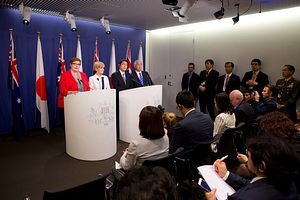On November 22, the Sixth Japan-Australia 2+2 Foreign and Defense Ministerial Consultation took place in Sydney. The Joint Communique, issued following the meeting, emphasized the relationship as a “special strategic partnership” that is “based on common values and strategic interests including democracy, human rights, the rule of law, open markets, and fair trade.”
Based on the agreement among the four ministers to prioritize a closer Japan-Australia defense relationship, the 2+2 meeting also endorsed further steps to institutionalize the bilateral defense relationship, such as an agreement to reciprocally facilitate joint operations, training, and exercises. Furthermore, the Joint Communique addressed a list of security concerns that are shared between the two countries — the South China Sea, North Korea, and terrorism, to name a few — as well as mutual interests in supporting regional and global multinational institutions.
This Communique is indicative of the increasing importance Japan attaches to its relationship with Australia. Although this is not a new development — the efforts to pursue a closer bilateral relationship can be traced back to the period when Prime Minister Junichiro Koizumi was in office — it definitely accelerated under Prime Minister Shinzo Abe’s watch. After all, it was when Abe succeeded Koizumi as the prime minister in the fall of 2006 that the two countries signed the Japan-Australia Joint Declaration on Security Cooperation, laying the foundation for the more robust relationship that the two countries enjoy today.
The Abe government considers a closer relationship with its fellow U.S. allies, such as Australia, as a key element in the “proactive contribution to peace based on international cooperation” principle of its national security strategy. Japan sees Australia as a country that shares Tokyo’s deep interests in preserving an international order that is based on a certain set of international norms, including freedom of navigation and no use of coercive measures to settle disputes among states. Given its constrained relationship with South Korea, it also has been more practical for Tokyo to pursue cooperation with Australia. Moreover, as fellow U.S. allies in Asia, Tokyo believes that it shares an interest with Canberra in ensuring that Washington, despite its diplomatic challenges in the Middle East and fiscal challenges at home, stays strategically engaged in a meaningful way in the Asia-Pacific region.
Now that the institutionalization of security relations between Tokyo and Canberra is almost complete — short of a formal treaty — the next challenge is how the two countries can leverage these frameworks to achieve and bring about concrete policy results.
For instance, the results of the Competitive Evaluation Process of Australia’s SEA 1000 submarine program could facilitate or dampen the incentive for more substantive bilateral defense cooperation on the part of Tokyo. There is a heightened expectation within Japan that Tokyo’s increasingly close security relationship with Canberra should work in its favor when it comes time to award the contract. In addition, the status of Australia-China defense relations — such as the recent successful visit to Australia by PLA Chief of General Staff Fang Fenghui — can also make Japan uneasy.
In this context, what Japan and Australia can accomplish either at the policy level or in practical defense cooperation between the Japan Self Defense Force and the Australia Defense Force in the next few years will likely determine whether the Japan-Australia relationship will have an enduring significance in Japan’s security policy priorities. After all, it is relatively easy to create a neat box. What matters is what goes into it.

































